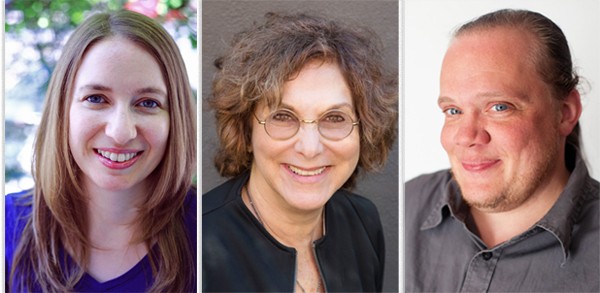2018 School Spending Survey Report
Authors Talk About the Teen Transgender Experience | SummerTeen 2015
Authors Susan Kuklin, Robin Talley, and Alex Gino spoke about transgender representation in books and the importance of making LGBTQ titles visible.

Authors Robin Talley, Susan Kuklin, and Alex Gino.
Talking about the importance of transgender characters in young adult stories, three authors shared their experiences in crafting, publishing, and pushing these materials to readers during an online session, "The Teen Transgender Experience." Moderated by Ingrid Abrams, a librarian at the Town School in New York City, the hour-long talk was part of School Library Journal’s 2015 SummerTeen virtual conference held August 13 and archived online. “I had friends who were transgender who were getting beaten up, teased, humiliated and really in a bad situation,” said Susan Kuklin, author and photographer of dozens of books including a 2015 Stonewall Honor Book Beyond Magenta: Transgender Teens Speak Out (Candlewick, 2014). “About six years ago, they weren’t talking about the ’T’ in LGBTQ.” These days, Kuklin and the other panelists are discussing transgender issues and the work and responsibility that goes into creating stories that resonate with their audience. Robin Talley, a novelist and author of Lies We Tell Ourselves (Harlequin, 2014), says she tries not to worry about how readers will respond, at least to her first draft. As a nonfiction writer, Kuklin takes a different tack, immersing herself in the people whose voice she presents to get their characteristics in her head. Alex Gino, author of George (Scholastic, 2015) made mention of how “valuable” it can be when transgender authors are penning stories—for transgender youth as well as those who are cisgender. During a Q&A session, a viewer inquired about how librarians can present transgender books to patrons when they may have trepidation on whether the topic will be well received. “I just put displays everywhere without asking,” Abrams answered, before turning the question over to the other speakers. Gino responded that while creating displays on transgender topics and novels may feel nerve-wracking for a librarian, an adult is in a better position to take that risk—making the books visible—than a child, and, in fact, has a “deep responsibility” to do so. “It’s really hard for us to do that, and it’s also really hard for that kid not to have media that represents them,” said Gino in response to the question. “It makes such a [big] difference in the life of [a] kid.” Toward the end of the session, Abrams noted that while librarians may not be authorities about LGBTQ lives, it’s important for them to learn as much as they can about their patrons—all of their patrons. “It’s okay not to be an expert,” she said. “But it’s our job for our patrons to do the best for them no matter who they are.”RELATED
RECOMMENDED
CAREERS
The job outlook in 2030: Librarians will be in demand
CAREERS
The job outlook in 2030: Librarians will be in demand
ALREADY A SUBSCRIBER? LOG IN
We are currently offering this content for free. Sign up now to activate your personal profile, where you can save articles for future viewing






Add Comment :-
Comment Policy:
Comment should not be empty !!!
Dee Omally
https://www.scribd.com/doc/270172860/The-State-of-the-Transgender-Union-2011-2015 I would like to share my own trans story! Thank you for this story!Posted : Sep 11, 2015 12:16